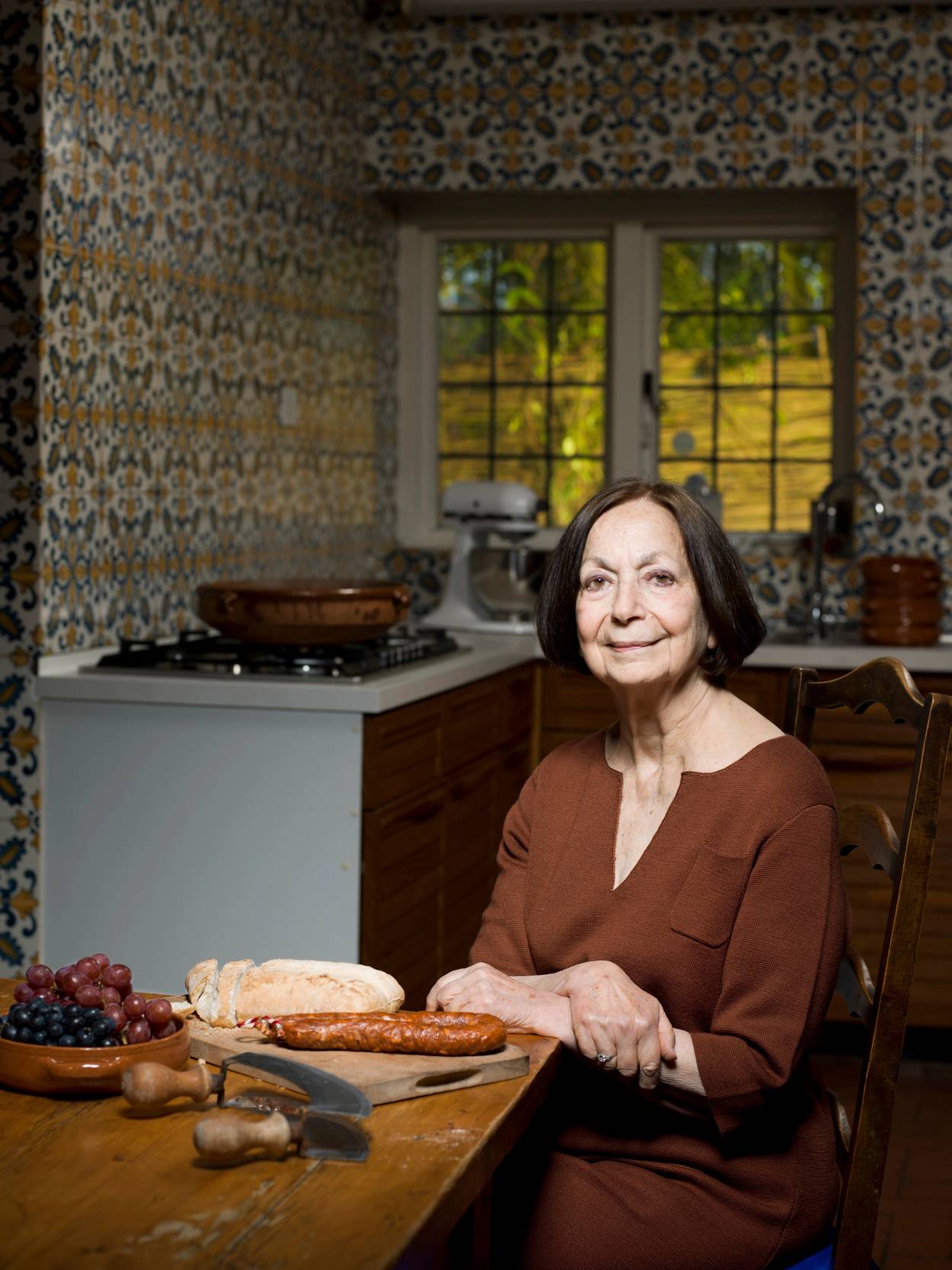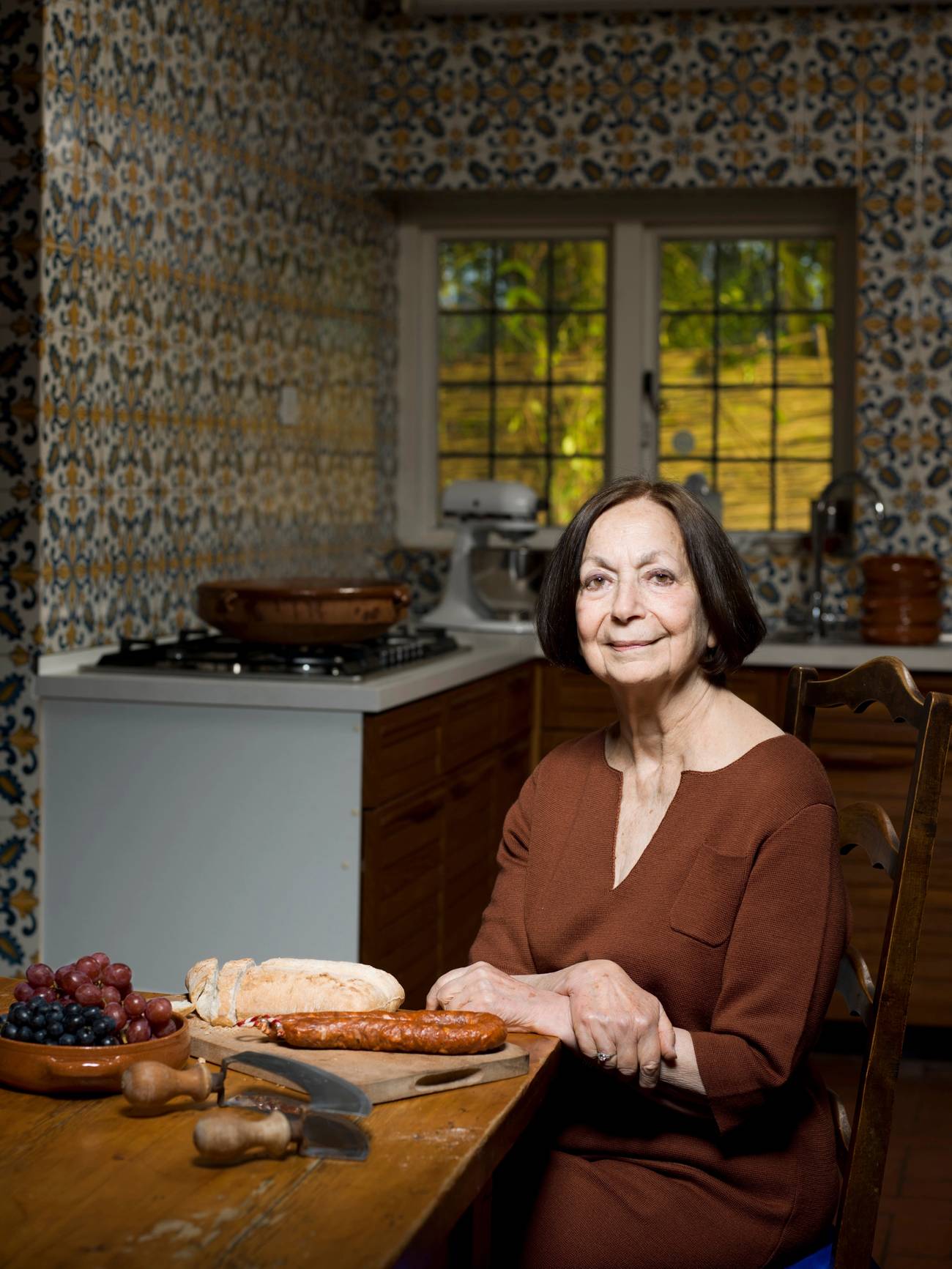Claudia Roden Comes Home
After decades of collecting recipes from around the Mediterranean, she comes back to her own kitchen in her new cookbook




For 60 years, food historian and cookbook author Claudia Roden built her career around leaving home. Whether she was traversing Morocco or Lebanon in pursuit of recipes, or joining an impromptu meal in the countryside of Sicily or Andalusia, she was perpetually on the go in pursuit of the next dish and story. Her travels led to some of the most celebrated and groundbreaking cookbooks of the modern era, including A Book of Middle Eastern Food (1968), which almost single-handedly introduced home cooks in England and America to the region’s cuisine, and The Book of Jewish Food (1996), which broadened these same cooks’ notions of what Jewish food was and could be.
Roden is 85, and after a lifetime of adventure abroad, her newest cookbook feels distinctly like a homecoming. Claudia Roden’s Mediterranean, which was published in November, focuses for the first time on her own North London-based kitchen, and the dishes she most enjoys serving to friends and family. The book’s recipes—roasted chicken with red grapes and rosemary, a bracing lemon tart the color of dandelions, or a green olive, walnut, and pomegranate salad that I have made at least three times already—are dishes to linger over, clinking glasses and willing the waning sunlight to last just a little longer.
The book’s dishes are also deeply meaningful to Roden, and the headnotes—the introductory texts that precede lists of ingredients and instructions—read like a memoir of a life exceptionally well lived. Readers learn about the time Roden interviewed Luciano Pavarotti for a British magazine about his favorite pasta dish (spaghetti with plum tomatoes, garlic, and basil). They hear about a “magical night” in Venice when she ate sauteed wild mushrooms over creamy polenta at a chef’s banquet. And they learn that she served roasted chicken with bulgur, raisins, and chestnuts to her grandchildren when they were young. “What I love most is to cook and to have people over—I need that,” she told me when I visited her at home recently. “I wanted to discover which recipes and memories gave me the most pleasure, so I could share them.”
While Roden’s newest book is undoubtedly the most personal, her entire body of work has been defined by her lived experiences, particularly her generation’s forced departure from Egypt in the 1950s. Roden’s grandparents had immigrated to Egypt from Syria 60 years earlier, following the completion of the Suez Canal. “A lot of Jews were involved in trade, and for years Aleppo was one of the great stopping places from the East,” Roden said. As the canal shifted that locus of trade to Cairo, and caravans and camels gave way to ships, many Aleppian Jews followed suit. They settled in El Sakkakini, a newly established district on the edge of Cairo, erecting synagogues, kosher butchers, and Jewish schools to serve the community. “All of my father’s stories were from there,” Roden said.
In Syria, Roden’s family had been quite religiously observant. Her great-grandfather Haham Abraham ha Cohen Douek (Roden keeps a framed portrait of him in her kitchen) was the chief rabbi of Aleppo. When they first moved to Cairo, many of her family members remained religious. They also held onto their traditions, living and cooking, as Roden put it, “as though they were still in Syria.” But, as with countless Jewish immigration tales before and since, things changed in the next generation.
As Cairo’s Jews left El Sakkakini and relocated to grander, more diversely populated areas of the city, they began to see themselves as modern, cosmopolitan citizens. “Things like keeping kosher became a thing of the past,” Roden said. And yet, Cairo’s Jewish community remained tightly connected to their heritage. Roden’s extended family was enormous (“One of my father’s sisters had something like 18 children,” she recalled), and Roden fondly remembers holiday celebrations centered around long tables filled with kibbeh, tabbouleh, baba ghanouj, and syrupy pastries served with strong coffee.
Everything changed in the mid 1950s when tens of thousands of Jews, as well as Greeks, Italians, Armenians, and other ethnic minority groups, were expelled from Egypt. Many people from Roden’s community fled to London (where Roden was already living as an art student), either settling there permanently or passing through en route to America, Israel, or elsewhere in Europe.
Long before the idea for writing a cookbook entered her mind, Roden began collecting recipes out of an urgent sense of family loyalty. The life she knew growing up had vanished almost overnight. Recipes were one of the few remaining links to that cherished past.
In Cairo, Roden told me, nobody had shared recipes. In fact, most families guarded their dishes like secret treasures, passing them down from mother to daughter, or sharing them only with the family’s hired cook. But once in London, the walls came down. People would say to one another, “Give me your cake recipe, because I might never see you again. When I cook it, I will think of you,” Roden said. “At first I just collected these dishes for my family, but then it went on and on.”
Before long, Roden had stumbled into a lifelong passion for collecting recipes. She widened her efforts beyond Egyptian refugees, and began seeking out dishes from other Mediterranean immigrant communities. “I hung around places such as carpet warehouses … where I could meet people from the Middle East and ask for recipes,” she wrote in the introduction to Claudia Roden’s Mediterranean. She also visited places like SOAS (the School of Oriental and African Studies), and London’s Iranian Embassy. “I would go and sit in the waiting room and they would ask, ‘Have you come for a visa?’” she said. “And I would say, “No, I am looking for recipes.’”
More often than not, she ended up with a handwritten recipe—and sometimes an invitation to dinner as well. “At the time, asking someone for their recipes was an odd thing to do,” Roden said. “People were excited that this young woman wanted to know something about them.” In the kitchens and around the tables of these strangers-turned-friends, Roden found kindred spirits along with new recipes.
Those interactions, multiplied by the hundreds, became the source material for her life’s work during a time when nobody, outside of people who came from Middle Eastern countries, cared at all about the region’s cuisines. “When I asked a librarian at the British Library to help me find books on Arab food, he came up with a list of translations of medieval culinary manuals,” Roden writes in the introduction of Claudia Roden’s Mediterranean. “There was nothing contemporary.” Roden’s books, then—particularly A Book of Middle Eastern Food and The Book of Jewish Food—were ahead of their time. And they created a pathway home for countless refugees and immigrants, just like herself.
“Basically all my mom’s recipes, which were the recipes of her childhood, came from Claudia’s books,” said Nathalie Istrou Ross, a Ph.D. student at University of North Texas who is writing her dissertation on the history of American Jewish cookbooks. Istrou Ross’ lineage shares a similar trajectory to Roden’s: a Sephardic Jewish family forced to flee Cairo. “For someone like me who never experienced Egypt, Claudia allowed me to capture the extended Jewish family I have never known, but always wanted to be a part of.”
Roden possesses a serene demeanor and a soft, lilting voice that, at first, gives the impression that she might be a little shy. But hearing her talk about her recipe-gathering process, her bravery and bold spirit becomes apparent. “Would you consider yourself an extrovert?” I asked, after she described approaching “anybody and everybody” on trains and at bus stops in pursuit of new recipes. “Oh, yes,” she said. “Growing up in the Mediterranean, we were not reserved—we fought to talk. That’s why I talk so much!” Living all of her adult life in the stereotypically reserved London, Roden missed the easy cacophony of her youth. Traveling around the Mediterranean for work ironically helped her feel at home.
Roden began working on Claudia Roden’s Mediterranean before the COVID-19 pandemic began. She already felt it was time to slow down, ease back a bit on her jet-setting life, and settle in. Her starting recipe list included hundreds of dishes: everything from the simple cucumber and tomato salad her mother used to make in Cairo, and the marble-sized meatballs with sour cherries her glamorous aunt Regine served at buffet parties, to a Sephardic flourless chocolate cake that her family baked to celebrate birthdays. “I would phone friends up and say, ‘I’m just making something to try, do you want to come for dinner?’” Roden told me. “I sort of created this new way of life for myself.”
When the first pandemic lockdown arrived in March 2020, the existing events on her calendar—an invitation to speak at a symposium or a dinner being held in her honor—were wiped clean. Like all of her peers, Roden spent the first many months of the pandemic in self-isolation, venturing out only to buy groceries at hours set for seniors to shop. But while many of her friends found the early pandemic to be a deeply lonely time, Roden discovered a blessing in disguise. “I had all of these events canceled, and I could just work,” she said.
As she made her way through testing recipes, she also managed to entertain. “I would set up separate tables in my garden, and each family would come and sit at their own table,” she said. “I sat on a chair in the corner of the garden, so we could be together while still separate.” With everyone working and studying from home, Roden said her children and grandchildren also became eager testers of the book’s recipes. “People kept saying, ‘You poor thing to be home alone!’” Roden said. “But the truth is, I have never seen my family more than during the pandemic.”
Roden’s world has opened up considerably in the past few months. She can shop for groceries whenever she would like, and can travel for events again as well. And yet she continues to bask in the pleasures of staying local—inviting neighbors and family over for a slice of walnut cake and strong coffee, and recreating the memories of the home she left so long ago.